#anti redeemable comedic insane
Explore tagged Tumblr posts
Text
I've been wanting to make a villain character so badly like I love villains and they always end up being some of my favorite characters but I've never truly made one and I'm like ??? how does that happen LOLLL *clown sounds permeate*
#yt has been recommending me a bunch of villain playlists for w/e reason#so it's just been on my mind the past two days#but I don't know what kind of villain I want cause I love all types:#anti redeemable comedic insane#they're ALL good ARGHH#So I dunno but the thoughts are taking root now mmm#character creating
1 note
·
View note
Text
My dedicated take on FNAF as a series, is that if you only count the main games from 1 to UCN, you have an absolutely batshit insane and incoherent but satisfying enough story for the series. From that you get the story of William Afton and his wacky murder spree that blows up in his and his family's face, Henry the good-natured business partner and bystander to the chaos, and the legacy of the Freddy's franchise permanently haunted by its inability to let go of greed in the face of tragedy.
Even though I think the series long ago wrote itself into oblivion with a lack of direction or substance to its nightmare of a story, there is one core theme to it that I think is executed very well - that being to leave the demons to their demons and let sleeping dogs lie. Which is so ironic for this series it's almost a Shakespearan, but I digress.
I feel like I rarely see the anti-buisness aspect of the series talked about, which is like it's most strongly written feature both comedically and thematically. The games fucking loathe whoever the hell is ever running the locations at any point in time, with jokes about non-chalant health and safety violations and lackadaisical regard for the rights and lives of others. Which ends up paralleling Afton himself if he's not straight up running the joint. Afton and the In-Universe franchise are parallels to eachother, both unable to give up selfish and destructive pursuits in the face of complete backfire and tragedy, and they both come out of it haunted af and haunting eachother. Even though I said fuck everything but the game canon (meaning remnant from the books), I do think the pursuit if immortality is a good motive for Afton just cause it makes it similar to the Fazbear Franchise's constant need to stay relevant no matter what.
This then makes Henry a great foil to both the Franchise and Afton, being just an honest fucking guy who doesn't seem interested in abusing the legacy of his creations nor mf child murder. And Michael as well being like his father physically, but being someone who can tell when he's fucked up and hurt those around him and repent for it. Even going through hell and similar consequences as his father, but still staying on track to redeeming himself. If you squint and ignore a bunch of bullshit and focus on some reoccurring motifs, you can almost slap together a compelling tragedy about a mix of personal and corporate greed suffering supernatural wrath.
The animatronics too only ever seemed to become worse the more I learned about supplementary material. Just stopping at, "most of them are normal and got haunted, and sometimes Afton made wacky terrible monstrosities with haywire AI", is good for me. And it's insane it took till like?? Sister Location for their animosity towards the night guard (Mikey Afton) to be explained, but it works for what I was saying about Mike's character. That he's literally going through twice as much hell as his dad did over a fifth of the sins and holds true through the whole series. I appreciate the interplay between the animatronics as children's mascots and haunted abominations landing on them having a well-meaning but bloodthirsty hatred towards their murderer. And for the toys, it was probably just that their facial recognition software was seeing Mike as William, and they were doing their job to protect the kids perfectly fine lmao.
Even past UCN as the lore and what plot there is continues to be shot full of holes and repaired with scotch tape, that theme of misfortune from greed is atleast still there in Glitchtrap. But then once again, HOW ARE WE WRITING THIS AND YOU HAVENT STOPPED YET?
1 note
·
View note
Text
The Goonies: Genre and Themes
As with every film, The Goonies is a hodgepodge of elements borrowed from different genres: a series of intertwined different sets of expectations that the audience is to expect payoff on.
Usually, a movie gains an audience by appealing to fans of its genre, or genres, since, as I mentioned, most films contain more than one. Typically, by appealing to these fans with a combination of appropriate star power, the name of a good director, and a use of genre brings in an audience, who is familiar with these elements, knows what to expect, and wants to see more of it. Genre is best used as a series of audience expectations that a filmmaker has to fulfill, rather than a series of tropes that have to be checked off in interesting ways to make a good action film, or western, or horror.
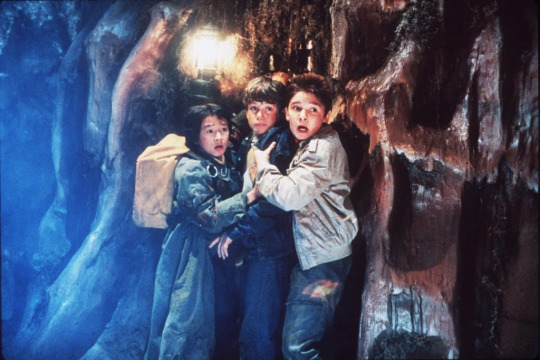
The reason for this is simple: one, if you want an audience, don’t confuse them, don’t bore them, and don’t disappoint them, and that means meeting their expectations, or subtly adjusting them along the way.
So…what were the expectations for The Goonies?
At first, it might seem easiest to say that it’s an adventure film.
Which, it is.
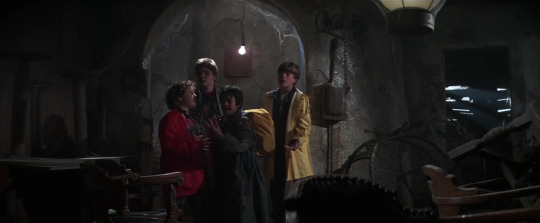
The story for The Goonies follows a group of kids avoiding dangerous criminals while searching for buried treasure, encountering booby traps, raging waterfalls, and skeletons galore. It very much strikes in atmosphere and surroundings an Indiana Jones-style feeling of adventure, bringing to mind the opening of Raiders of the Lost Ark. However, while the Indiana Jones films, while possessing a slight comedic slant in several scenes, including action ones, the stakes in those films are typically much higher than the Goondocks, and as a result, it overall takes itself more seriously.
The Goonies is not a film spent with the audience at the edge of their seat, biting their nails in terror that one of the kids is going to be killed, or even seriously hurt. At no point does the audience believe that Chunk’s hand is actually going to be subjected to the blender, nor do they think that Data’s fall will kill him, or that the floor collapsing from under Mouth is going to lead to his untimely, unceremonious demise. The stakes are there, certainly, and the characters clearly believe they are in danger (rightfully), but the audience never has a heart-in-throat moment of: this is it for them.
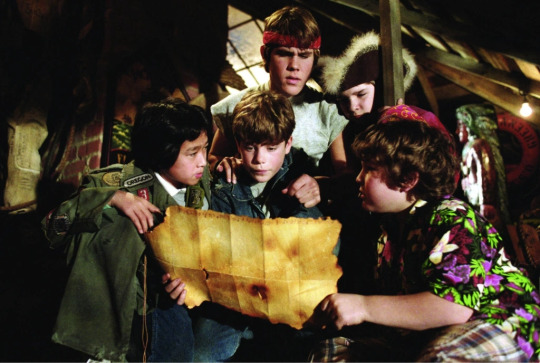
Which is odd, because our villains are armed with guns, and the floor does collapse, and our heroes are in danger. They believe it, to the point where Brand pulls Mikey out of the cave, away from the loot, because their lives are more important than the treasure. The group bursts into hysterics when they think Data has fallen to his death, and Brand and Mouth don’t exactly handle seeing a skeleton, a reminder of their own mortality, trapped under one of One-Eyed Willy’s booby traps. Characters are held at gunpoint, swordpoint, are pushed off of planks, and are nearly crushed by falling rocks, and while, for the sake of the story, they are terrified for their own lives, the audience never really feels the danger.
We feel the danger for their sakes, certainly, but in the end, the audience is actually more concerned with whether or not Mikey and Co. are going to get the treasure to save the Goondocks than whether or not they’ll survive, because we know that already. We know, based on the tone and style of the film, that they have to make it, and be alright in the end. The stakes of the goal are high to the characters and the audience: the money for the Goondocks, but the stakes for the story aren’t quite as severe, seemingly.
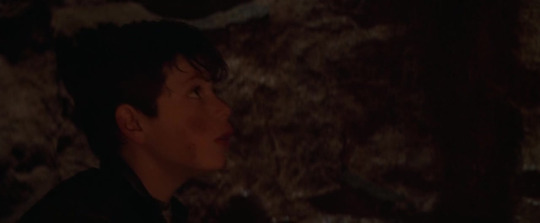
Part of that is due to, like I said, the tone, which I’ll get to in a minute. But the other portion to assisting the audience’s suspension of disbelief has to do with the themes of the film.
See, themes aren’t only for in-depth films that contemplate the meaning of life. Themes are present in every film we watch, whether it’s a theme of anti-authoritarianism (Escape from New York, They Live), success through perseverance (Rocky), or as simple as love (Casablanca) or good vs. evil (Star Wars). Even if it’s not intentional, every movie carries with it the inherited worldview of its creators and what matters to them, especially as it concerns this particular story. The same is true for The Goonies.
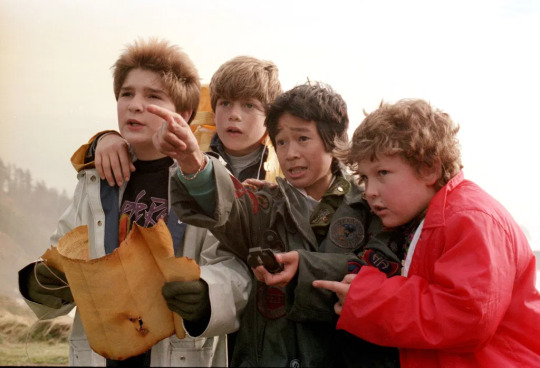
At the center of The Goonies is, of course, a basic struggle of good vs. evil, albeit in far less ‘epic’ terms: a group of kids trying to save their homes versus murderous criminals, and worse, businessmen trying to uproot their homes and separate them, leading to the real major theme of the movie: friendship.
The Goonies don’t want to leave Astoria because they’re so terribly fond of their own driveways. It’s because they’re fond of each other. As much as they squabble and tease each other and argue, they are friends, and they don’t want to be separated. In fact, their friendship and love for their home is so strong that, even when their lives are endangered, they stick together, even where there are opportunities to turn back.
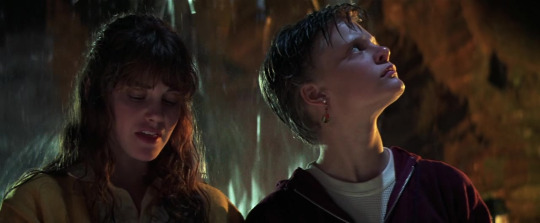
But as important as the friendship between the Goonies is, it’s not the only friendship in the film that’s key to the story.
Chunk’s bonding with Sloth not only saves their lives, but also provides a happy ending for Sloth, too. By the end of the film, Sloth is practically a Goonie himself, and the rest of the group embraces him without a second thought. The group functions almost like a large family: they don’t always get along, (in fact, they often don’t) but in the end, what matters is that they care about each other, enough to face some pretty intense stuff.
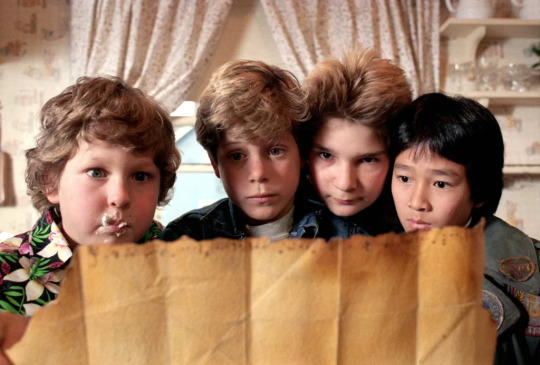
Which is another good point.
While friendship and good vs. evil factor easily into a good adventure movie, what’s interesting to note is that while Indiana Jones or any other average adventure hero has to go with it: tons of courage, and usually some competency to go along. The Goonies unfortunately only have the former, which makes sense. The average age of the lot of them is thirteen.
Bravery isn’t exactly uncommon to see in adventure films: nobody wants to watch a cowardly hero in a straight adventure film. But for the average hero, they have skills that help along the way, strength, speed, wits, intelligence, a specialized set of abilities. The Goonies, on the other hand?
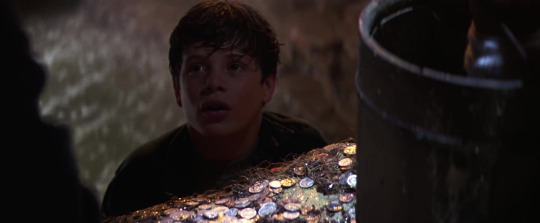
They’re kids. The oldest among them are still high-schoolers. Their skills are limited: Data’s inventions, Mikey’s leadership and optimism, Mouth’s ability to translate Spanish, and Chunk’s timing all come in handy throughout the film, but it never changes the fact that they’re kids against three adults who won’t think twice about killing children. This changes their ‘courage’ somewhat into either some insane levels of idealism, or determination at the cost (sometimes) of common sense. Mikey has to be convinced to escape from the collapsing cave instead of going back to get the treasure.
So what does that tell us?
It tells us that their goal means something to them, that they care immensely about it, and that it’s worth the danger. Are they scared? Of course. But in that friendship, in that goal to defeat the evil of the Fratellis and the rich families about to bulldoze their houses, they find the courage to keep moving, to reach that goal.
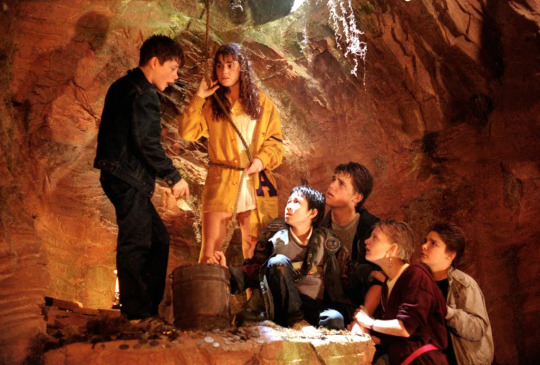
In the end, the Goonies never beat the Fratellis. They get away, sure, but it’s Sloth and the police who have far more to do with the actual ‘defeat of’ the main villains of the film. After the Goonies escape, the prize of the movie seems to be their lives, with the Fratellis being left behind with the treasure. You could argue this means that the Goonies aren’t very brave, seeing as they never had a final ‘battle’, or climax with the Fratellis, but it’s important to remember that the Fratellis aren’t really the antagonist of the Goonies. They’re antagonists, for sure, but they aren’t the person who is causing the problem in the first place, kicking off the adventure. That would be Mr. Perkins, the guy trying to get them out of the Goondocks. As a result, while the Fratellis are apprehended by third-party law enforcement, the Goonies get to ‘defeat’ Mr. Perkins themselves, by having enough money to save their homes.
Is it ‘final battle’ level of epic climax? No. But again, they’re thirteen years old, and with that in mind, then staying one step ahead of hardened criminals, escaping, and saving their home anyway (all against adults more competent and powerful than they are) is plenty brave enough for me.
Both villains in this story have one thing in common: Greed. Greed has always been a pretty common theme in stories, and that extends to moviemaking too: The Treasure of the Sierra Madre, Wall Street, and Citizen Kane are films held in high regard that revolve around greed, and what it does to people. Other films like It’s a Wonderful Life take an even firmer, more obvious stance, pitting its protagonist against a cruel, greedy antagonist with no redeeming qualities. In short, we as audience members have a pretty good idea of what greediness looks like, and we know that we don’t like it. The Fratellis and Mr. Perkins are entirely motivated by money: Mr. Perkins can only think of the benefits to himself for tearing down the Goondocks, whereas the Fratellis, counterfeiters and thieves, are simply after the treasure for their own personal gain.
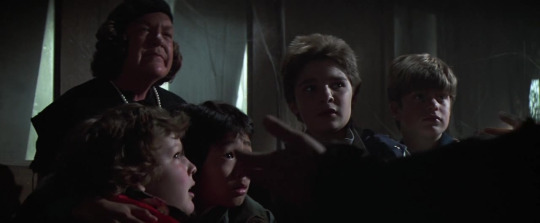
Now, of course, the Goonies are after it too, but you’ll notice something very important here.
Sure, the Goonies want the treasure. That’s the whole point. But the thing that prevents this from being an act of greed is obvious: ‘intent’. Mikey’s protests about wanting to go back and get the loot is not because Mikey was struck by sudden gold-fever or Dragon Sickness, it’s because he wants, more than anything, to save their home. It’s what they all want, in fact. They’re doing this for a good cause: for each other, not just themselves, to meet a need. None of the kids ever mention getting rich from this. They all have the same goal, and there are never any of the typical fights about how the treasure gets split, or what they’ll do with their share.
These themes all overlap very neatly into the film itself, though it seems a little odd to cut them up and lay them out like this, but there is one thing that ties it all together, albeit, probably without meaning to. I’ve mentioned the ages of the kids a few times: ranging from about thirteen to around sixteen or seventeen. There have been plenty of movies about kids, for kids, and about kids for adults, but The Goonies manages to straddle a line and become a movie about kids, for everyone.
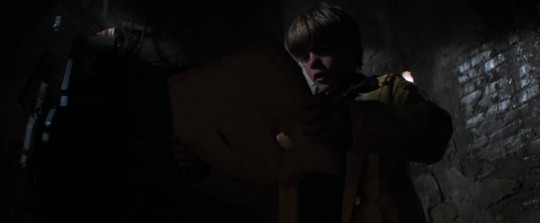
Youth is a huge part of this movie. Adults do not find treasure maps and decide to go on an adventure in order to save their homes because the insane, idealistic, wide-eyed streak has already been burned out of them by life. They already know the rules of the world, and know that that’s not how that works. As such, the fact is, there’s no ‘Goonie’ storyline if the characters aren’t children. Kids are infinitely more emotionally attached to their homes at that age, and will do anything to stay together. Kids haven’t been told yet by the world that their hopes and dreams are unrealistic. They still believe they can do great things, like save the Goondocks.
Even throughout the rest of the film, you can’t replace these characters with adults. They cry, they scream, they panic, they fight and argue with each other, and they all remain friends, unquestionably, and the adventure molds around them, allowing them to continue to be children as the story progresses. The danger is real, but it never feels too big for them, or too small for everyone else.
So, what does that mean for genre?
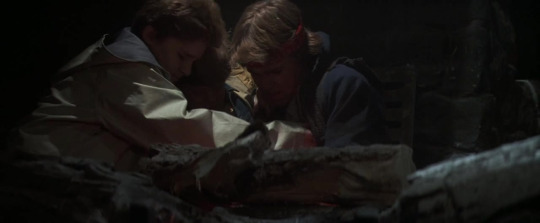
None of this detracts from the fact that The Goonies is very much an adventure film. Early on, the expectations are set up for the audience: the opening car chase and the discovery of the map in Mikey’s attic immediately set up the idea that there is going to be an exciting, dangerous story ahead, full of unexpected, unusual circumstances. That’s exactly what we get.
While the audience may never feel outright danger for the characters’ lives, like I said, they do worry for the Goonies’ end goal, and there is certainly plenty of excitement along the way. That is, in fact, the emotion most felt by the audience throughout the film. The movie is a roller-coaster full of superficial danger without any real stakes, and plenty of heart-in-throat moments. The trek through the tunnels, Chunk’s run-ins with the Fratellis, meeting Sloth, finding the pirate ship: are all dips and climbs throughout the amusement park ride that is The Goonies. The audience is constantly on the edge of their seat, and almost every story beat is active payoff of that adventurous expectation.
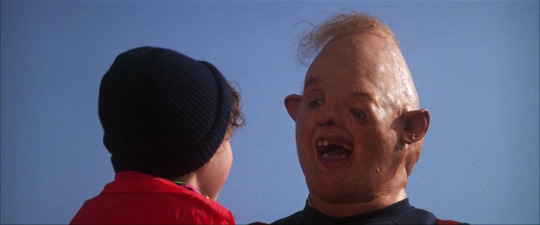
But there’s more to this movie than just the thrills.
Part of the difficulty of developing an adventure film for kids is that you either have to put children in danger, or you run the risk of feeling too safe. Kid adventure movies of the ‘80s like E.T. the Extra Terrestrial utilized an even balance, but as I mentioned, there’s no real fear for the Goonies’ lives. This is for a rather specific reason:
The Goonies went for the laughs with the thrills.
Data falling through the cave floor? Terrifying. Data falling through the cave floor and being saved by his invention while the rest of the Goonies go into hysterics? Hilarious.
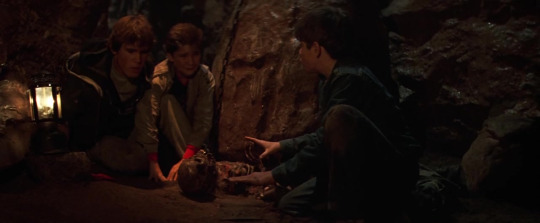
The Goonies going after the treasure? Exciting.
The Goonies letting the air out of Brand’s tires so he has to steal a little kid’s bicycle to go after them? A comedy highlight.
The Goonies being cornered by the Fratellis and forced to give up the treasure? Legitimately upsetting in the moment.
Mama Fratelli forcing Mouth to spit out the gobs of gold and pearls that he’s stashed in his mouth? Genuinely funny.
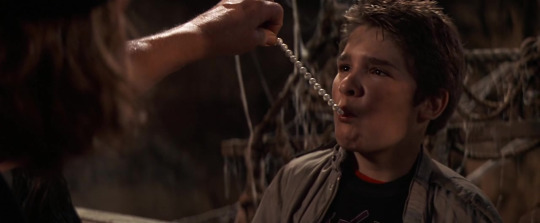
The movie is constantly playing that balance. No exciting moment is without it’s humorous side. The kids are in danger, but they’re also always reacting in humorous ways, like Mikey making a half-hearted joke when Andy’s trying to play the bone organ while the floor collapses. A lot of what people remember about this movie are the laughs, with good reason: there’s a ton of them.
The Goonies has no shortage of funny moments and humorous lines, again, some of the most quoted lines of the film happen to be the ones that made people laugh. But as I’ve said before: there’s a lot more to being a comedy than just being funny.
Comedy is a very broad umbrella, one of the genres most easily mixed with others to create a blend: such as, what would seem to be a comedy-adventure story. Comedies typically rely on either absurd, exaggerated, or humorous characters, or an absurd, exaggerated, humorous plot, such as in films like Coming to America or Ghostbusters.
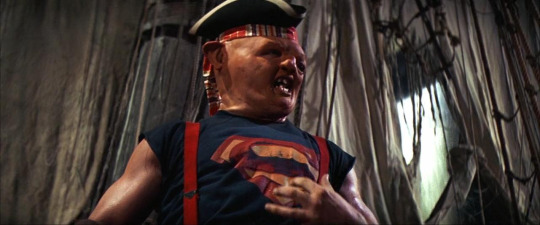
So, how does The Goonies fit? The plot is exaggerated, for sure, but not exactly in an inherently humorous way.
There’s a very easy way to tell exactly what genre it is, between adventure and comedy, and I’ll show you right now:
Typically, a really good way to tell a film’s genre is to take a good look at the characters, especially the main protagonist, and the story beats. These elements best illustrate exactly what kind of story you have, and in the case of The Goonies, it’s fairly easy.
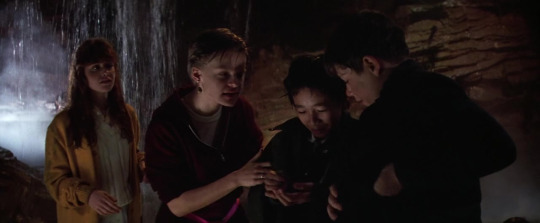
Like I said, the story for The Goonies is clearly exaggerated beyond the realm of belief. Kids don’t find treasure maps in their attics that lead them to pirate ships. However, the story isn’t played as ‘funny’, nearly ever. The skeletons and booby traps are played completely straight, with very little to laugh at. Indeed, in another movie, these booby traps may have actually hurt or killed a character.
In The Goonies however, while the plotline is a very straightforward ‘kids Indiana Jones’ adventure story, the characters are considerably more…colorful.
And funny.
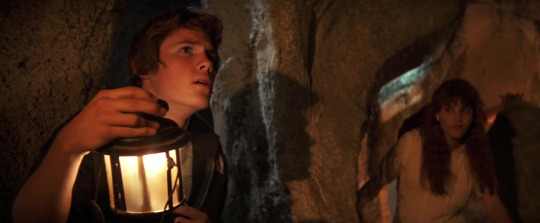
Mikey’s mispronunciations and his bickering brother relationship with Brand, Andy’s hysteria, Data’s plucky mildly ‘nutty professor’ vibe, Chunk’s over-the-top reaction to his misadventures, Mouth’s…mouth, and Stef’s complete and total irritation with everyone around her lead to some hilarious interactions, and some genuinely funny characters in their own right. Everyone is quirky, and not just to give them more character, it’s also to get them to be funnier. They aren’t alone in this, either.
The Fratellis, although still remaining chief antagonists, are not without their own comedic slants as well. Their own bickering amongst themselves and the over-the-top levels of abuse that get doled out equally manage to keep them intimidating for the kids, but funny for the audience, enough that there’s never a point where they reach true ‘villain’ status.
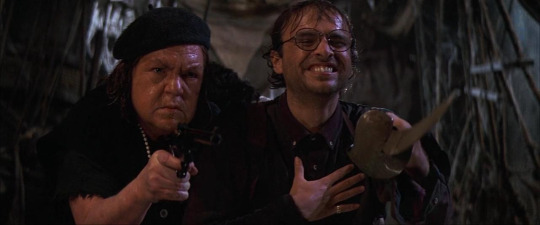
With that combination in mind, the film actually manages to hit the comedy-adventure balance pretty evenly. The situation remains threatening, but the thing that actually prevents the audience from worrying are the characters themselves and how they are portrayed: as indestructible characters in a cartoon. They’re likeable enough to keep the audience invested, but humorous enough to keep the audience from fearing for them. It’s the ideal combination, and it works, with just a dash of something more:
Heart.
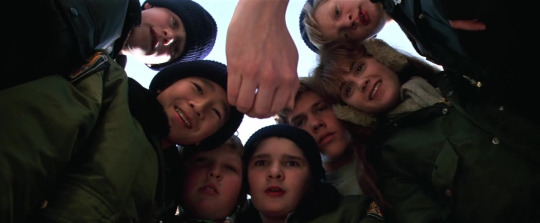
The Goonies is remembered for its humor and its adventure, but it’s also remembered for its heart. Brand hugging Mikey as they briefly connect over the fear and sadness of losing their home, Mikey’s inspiring speeches, ‘Goonies Never Say Die!’, Mouth’s passionate outburst about his dream, his wish, Sloth’s friendship with Chunk, even the ending, with Brand and Mikey’s dad proudly proclaiming that there will be no signing, with the kids watching the pirate ship sail into the sunset…it fills the audience with at least a little bit of warmth.
In the end, we care about the Goonies because the movie makes us care about them. They make us like them, and so we feel for their adventures. There’s a real, legitimate sense of family throughout it, down to the aggressive fighting to the make-up hugs that follow.
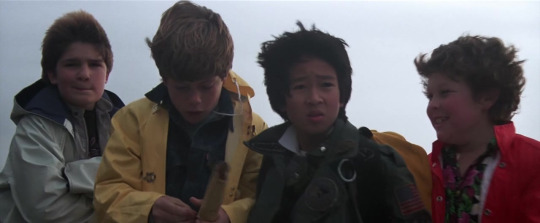
The Goonies is often considered a ‘family’ movie, something that may surprise viewers after hearing some of the language used by the kids, the corpses, and the fact that the kids are in legitimate danger at times, but in a way, it’s not very surprising that this is considered a family film.
The tempering of the action with the comedy certainly helps, but the real kicker to make sure that it’s considered a ‘family’ film is its focus: family. Friendship. The people you care about. Banding together against all odds.
Yes, the plot appeals to kids, and so do the characters, for obvious reasons: the characters are kids, with child-like goals. Adults typically don’t react so strongly to learning that they have to move, at least, not to the point of going treasure-hunting to prevent it. However, while kids can grasp what the Goonies are about, adults can too.
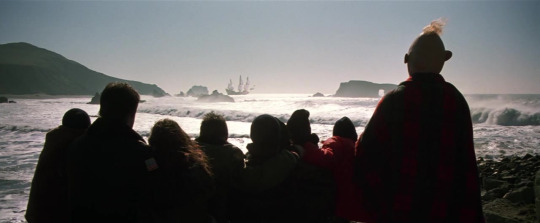
Adults remember what it’s like to be kids, to have those hopes and fears and dreams, and can get into it just as well. Family movies aren’t movies for kids, necessarily, but they are movies for families, that can be enjoyed by everyone, because everyone can relate to the story and characters. This means that family movies tend to be pretty basic, uncomplicated, full of what could be derogatorily called ‘false excitement’, with characters that are fairly static and simple, but with gripping emotional themes that everyone can get behind.
In the case of The Goonies?
It fits the bill every step of the way.

In the end, The Goonies is an adventure film, one that promises it’s audience excitement and pays off every minute, and a comedy film that promises laughs, and again, delivers, and in being both of those things, it’s also a family film, with both of those things, and lots of heart to go with it, to offer in spades to an entire family.
The result?
The Goonies is an exciting, charming, funny adventure film about kids who are charming, funny, and adventurous, leading to a perfect, consistent tonal blend that manages to stay with the movie from start to finish, creating a roller coaster, amusement-park ride of a film that has been loved, with good reason, by people of all ages since it was first released, entertaining families passing it down through generations for over thirty years, and will continue to entertain families for years to come, as long as kids continue to be kids, and adults can remember what being a kid is like.
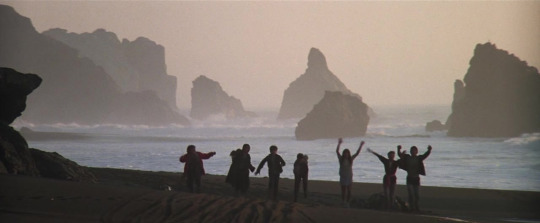
Don’t forget to leave a comment, like, or some other form of love if you enjoyed this analysis, and please, follow for more articles like this! Thanks so much for reading, and I hope to see you in the next article.
#80s#1985#Film#Movies#The Goonies#The Goonies 1985#Adventure#Comedy#Family#PG#Sean Astin#Josh Brolin#Jeff Cohen#Corey Feldman#Kerri Green#Martha Plimpton#Ke Huy Quan#Richard Donner
14 notes
·
View notes
Text
She-Ra and the Princesses of Power, Season 5, Episode 13, “The Heart, Part 2,” First Impressions!
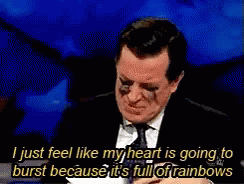
I am going to miss this show, I really am.
Well. Here we are. The final episode of She-Ra and the Princesses of Power, an almost three decade later reboot of a show I’ve never seen, which in turn was a spin-off of a show I’ve never seen, and yet somehow became one of my favorite shows of all time.
Now, when this show was first announced, there was a lot of pushback. You had the usual murder’s row of so-called anti-SJW troglodytes who like to swoop in on anything that looks like it wasn’t designed with straight white guys in mind (and speaking as a straight white guy, these guys are just. So. Tiresome!), as well as fans of the original who didn’t care for the new character designs, direction, or lack of connection to Masters of the Universe. Which, okay, I get it, and to be honest the little to no He-Man business still strikes me as weird, but come on guys. It’s been almost thirty years! Times have changed, audiences have changed, and the targeted audience of kids’ shows today are very different from what they were in the eighties.
But despite all that nontroversy, She-Ra rose above and established itself as a genuinely great show in it’s own right, becoming both a critical and commercial success. Like, okay, it wasn’t Avatar the Last Airbender or Steven Universe-level big, but it definitely established a real niche for itself and gathered a sizeable fanbase. The excellent writing, incredibly on-point comedic timing, superb voice acting, casual diversity, oodles of complex and likeable characters, tight-plotting, mature handling of difficult topics, and immaculate direction made it out to be an amazing children’s show from a decade that has had no shortage of amazing children’s shows, and expectations were insane for the final season, with the climatic final episode being under incredible scrutiny.
I mean, it makes sense, right? For once, given the huge LGBTQ fanbase the show has, and given how many times the LGBTQ community have been burned at the last second, there is little wonder that they would be wary. And while some shows like the aforementioned Avatar the Last Airbender and Breaking Bad have remained of high quality throughout its run and delivered with an excellent finale (or so I’m told, still working my way through), others like Voltron Legendary Defender and Game of Thrones have become notorious for shitting the bed in their latter halves, and other shows like Steven Universe have had more mixed receptions. So how would She-Ra turn out? Would it end up flopping at the end, or would it stick the landing and enter the pantheon of shows that actually completed their entire story arcs and are fondly remembered?
Yes. Yes, it did.
The final season was spectacular. It started off all right, but from the third episode on immediately turned into pure brilliance, one that seemed to constantly top itself with wonderful character development, emotional payoffs, scenes of gripping tension, ballsy writing, and fantastic action. And any finale that makes me cry gets a thumb’s up from me.
Now, obviously I have a lot of gushing to do, but before it do, I should point out that I don’t think the finale is 100% perfect. There are things that kind of bugged me, and a few others that I felt really could have done better. Of course none of them were deal breakers, only little flaws that I feel could have stood to either have had more focus or different execution. And I might as well get the negative things out of the way.
And for me, the biggest problem is Shadow Weaver’s exit.
And to be clear, I don’t have a problem whatsoever with Shadow Weaver dying. I wanted her to die. I’m glad she died. Nor do I have a problem for her dying to save the two girls she’s spent two decades abusing. And nor do I have a problem with them mourning her death, given that they never actually forgave her, and it only made sense that they would have complicated feelings toward her. All of those are fine!
What I have a problem with is how that moment was framed and directed. It was framed like a heroic sacrifice, from the dramatic final stand moment to Shadow Weaver being suddenly acting selfless to her telling Catra how proud she was of her and finally showing her face.
Everything about that moment was exceptionally well done, yes, but the problem I have is that it doesn’t feel earned. That’s the sort of end you give a morally complex character that has been struggling with their negative qualities throughout a long character arc. And I’m sorry, but while Shadow Weaver is a pretty great and complicated character in her own right, she as never even tried to redeem herself until that moment. With Catra, we still saw how much her actions haunted and tormented her, even when she was at her worst. We saw her wrestling with her ingrained toxic behaviors and her conscience, so that when she finally makes the decision to do something right and, as far as she knew, sacrificed her life to rescue Glimmer and save Adora, it felt all kinds of earned!
But even after defecting to the Princess Rebellion, Shadow Weaver showed no signs of wanting to change. She showed no signs of regretting her mistreatment of Adora and Catra, and still continued to demean, undercut, and gaslight them whenever she was with them, and whenever she was called out on it, she would just brush it off and/or roll her eyes. Even when she was “helping” and “praising” her golden child Adora, she still continued to try to twist her head and mold her into what she wanted Adora would be. And her treatment of Catra didn’t change at all.
So I’m sorry, but that moment just didn’t work for me. Yes, I know Noelle has said that her sacrifice was still selfishly motivated, and I believe it, but it still felt off, especially with her finally telling Catra that she was proud of her, when she was AGAIN demeaning her earlier in that same episode! It carries the unintentional implication that Catra needed Shadow Weaver’s validation in order to move on. I honestly would have preferred that she never got it but realized that she didn’t need it to begin with. And that “You’re welcome,” which is incredibly condescending, was framed as a badass final line. There’s a disconnect between her character arc and its payoff that feels off. I wish something had been handled differently.
The second issue I had was just how rushed a lot of the character payoffs felt at the end. Yes, I know Noelle said that she doesn’t want to do an epilogue and would like us to decide for ourselves how things turned out, and that’s fine. But one day later wouldn’t hurt. Wrong Hordak was shown a couple times cowering next to Swift Wind in group shots and then straight up disappeared. And given their complicated history together, Scorpia and Catra deserved so much more than just a hi and a hug. Chipped Micah was given more time to harm and demean Glimmer than real Micah was given to love her. The Entrapdak thing got more focus and despite what I said about Hordak needing to either die or lose his memories, I’m not too upset that he didn’t do either, but instead simply broke free and got a happy ending, and Mermista’s line of, “So, are we like okay with this?” was great, but it feels like there should have been more. And I know they never had their own character arc and did all they needed to do last season, but if you’re going to bring Double Trouble back, then give us more than just one episode and a two-second cameo at the end.
Like, just give us some kind of montage of the rebuilding stage. Show us Wrong Hordak leading his scared and confused brothers in becoming individuals. Have him meet the real Hordak and show us how they would respond to one another! Give us a proper Catra/Scorpia reconciliation! Do more with Double Trouble or don’t bring them back at all. Hell, pair them up with Wrong Hordak partway through the season so they could bounce off each other, because that would be comedy GOLD! And while I’m glad that we at least got to see Lonnie, Kyle, and Rogelio (and they adopted Imp!), it sucks that that was their only scene this season, and it didn’t even have any lines. I’m not so upset about Huntara, because I know her voice actress is hard to get ahold of, so I’m okay with her just getting a wordless scene, but the others kind of bug.
I understand that time was a factor, but surely something could have been done.
All right, now I got all those out my system, let the gushing BEGIN!
Catra and Adora. Oh man. Oh man oh man oh man oh man. Now, I know I said that Catra needs to leave in order for her redemption to work, but even though she didn’t and got pretty much forgiven and accepted by everyone she hurt, I’m still very happy with how her redemption arc went down. Because she made the switch early in the season, showed genuine regret for what she did, made real attempts to apologize to those she hurt without expecting forgiveness, was shown wrestling with her bad traits, sometimes falling back into them, sometimes almost succumbing to bad habits, but was also shown finally making the right decisions and rising above them. She was the best-written character in the show with the most complex character arc, and they fucking NAILED the landing.
And that is because of her love of Adora.
Catra and Adora, two white-hot messes of weirdly compatible issues. Catra is so afraid of abandonment that she instinctively pushes those she loves away or runs away herself rather than let them leave her, and Adora only knows how to place others before herself, to be selfless to a fault, take all the blame for everything, and not let herself be the one who’s loved and protected. The two needed each other in order to overcome their issues, to put aside the damage Shadow Weaver instilled in them.
And they finally did.
Catra came back for Adora. She stayed by her side, refused to leave, and refused to let Adora give up. And Adora rose above her feelings of failure, allowed herself to be loved by another, and became whole.
And then we got it. We finally got the moment we’ve all been waiting for, all been praying for, all wanted so goddamned desperately.
We got the Big Goddamn Kiss.

The love each other. They’re lovers. They’re soulmates. After everything, how could they be anything else? It’s pure, 100% romantic love, a full, no ambiguity friends-to-rivals-to-enemies-to-allies-to-lovers storyline. Not subtext, no reading between the lines. It’s real, it’s canon, it’s between the two main leaders, and it happened right on the screen and saved the goddamned world.
Catra finally reached out to someone and showed love, and Adora finally allowed herself to be brought up and loved. And it’s that love that overcame Horde Prime’s virus and destroyed the Heart of Etheria. It’s that love that freed the magic, released She-Ra, and allowed her to vanquish Horde Prime once and for all.
And hey, two girls kissing, turning into a rainbow, and annihilating the influence of a controlling religious cult and the symbol of exploitative colonizers? Hmmm, subtle!
I love it.
Look, after everyone talking about how much the finale made them cry, and after already sobbing my eyes out when Angella sacrificed herself in season 3, I was worried that I wouldn’t feel the same, that everything had already been spoiled for me so it wouldn’t have the same emotional impact. Hell, the kiss itself had been spoiled for me! So if I knew it was coming, how could it affect me like it did others.
I was wrong. I was so wrong. When Catra screamed at Adora that she loved her and always had, the tears came gushing out. And when they finally did kiss, it made me happier than I had been for a long time. It was such a beautiful moment, and it was so wonderful to see all the magic unleashed, turning Etheria back into the paradise it was meant to be, and the Spire into a giant floating sprig of broccoli!
The Horde was finally defeat, and Horde Prime ripped out of his Wi-Fi network and destroyed once and for all. He will not rise again. His corrupted vision of purity is finally eradicated once and for all, and the galaxy is free again.
It was wonderful.
Other moments I want to highlight! Beginning with Bow!
Oh Bow. I haven’t talked as much about you as I did at the start of the show, but you really are wonderful. After similar unpowered male goofball sidekicks like Xander and Sokka being big balls of toxic masculinity and ingrained misogyny caused by insecurities that they had to overcome, we get an unpowered male goofball sidekick who is a shining example of positive masculinity, someone who knows who he is and is comfortable with it, someone who more than holds his own in battle, constantly makes himself useful, and stands proud with his superpowered friends. And even then, he still feels like real person, one that gets frustrated, feels down, and gets angry at both himself and his friends, but still continues on, because he’s a soldier and that’s what he does.
So it was wonderful that he got the Rise Up and Fight speech, because he deserved it, and oh it felt so good, seeing all those instances of people throwing off Horde Prime’s control while his words were playing. Bow really is wonderful.
And Hordak! Look, I know what I said about wanting more from his ending, but my God, that moment when he threw off Horde Prime’s control and shot Horde Prime in the back to save Entrapta and reclaim his identity was so! Fucking! Cool! I was cheering in my car when that happened! So good!
And hey, give it up for Glimmer for not listening to Chipped Micah and refusing to back down. She overcame a brilliant sorcerer wielding dark magic through the power of sheer stubbornness! Chef kiss, beautiful!
Though I really do think she got most of her stubbornness from her mom. Miss yah, Angie.
And Scorpia and Perfuma? Why, I think I like that quite a lot! Why yes, give Perfuma a big, strong girlfriend with a huge heart! Give Scorpia tiny, cute hippie girlfriend who will take no shit from anyone. Yes, I like this very much.
So...yeah. This really was wonderful. The world is saved, the Best Friend Squad is about to go on a space romp, and it feels good. And from there? Well, Noelle told us to come with that ourselves, so yeah, I’m sure Etheria was able to fully rebuild following the Horde’s destruction. I’m sure that Wrong Hordak became some kind of benevolent leader to his lost brothers and helped them come to grips with their individuality. I’m sure that Scorpia rebuilt the Scorpion Kingdom from the Fright Zone’s ruins and made it a haven to the lost Horde soldiers. I’m sure that Sea Hawk and Mermista burned down a boat together. I’m sure that Glimmer and Bow were married and became king and queen of Brightmoon and had a long and loving reign with lots of babies. I’m sure that Entrapta was given all the discarded Horde and First Ones tech to crack and find good uses for and remained as happy as a clam, especially considering the Hordak harem she’s built. I’m sure that Adora and Catra continued to build each other up, helped and supported one another to keep themselves from falling into bad habits, and Melog was always there as a faithful therapy magi-cat. I’m sure that Perfuma helped Catra along with meditative exercises and Catra never had the heart to tell her that she was just napping. I’m sure that Frosta grew up to be a strong and powerful queen who also founded her own iceball league. I’m sure that everyone started going to Netossa and Spinnerella’s game nights and just decided to put up with Netossa when she got like...that, because at that point she deserved to. I’m sure that Swift Wind finally did emancipate the horses and taught them to form their own weird society, but still made time to visit Madam Razz. I’m sure that Kyle and Rogelio became proud adopted fathers of little Imp, and one day while chilling at the local pub, Lonnie caught the eye of a big, strong purple woman.
I’m sure they were all very happy from there on.
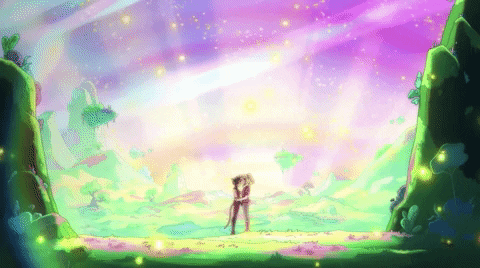
I am going to miss this show. It was a wonderful experience, one that’s given me so much. It made me laugh,it made me cry, it made me cheer, it made me shiver, it made me bite my nails, but most of all, it made me happy.
So thank you Noelle and Molly. Thank you Chuck and Mary Elizabeth. Thank you Sunna and Aaliyah. Thank you Aimee, AJ, Karen, Marcus, Keston, Reshma, Lorraine, Christine, Adam, Genesis, Vella, Merit, Gina, and Jordan. Thank you to all the writers, animators, and directors. Thank you to everyone who worked on this show. Thank you all.
And a very special thank you to @smxmuffinpeddling for filling my dash with She-Ra content, which convinced me to check this show out in the first place!
#she ra and the princesses of power#she ra#spop#adora#catra#bow#glimmer#horde prime#hordak#mermista#sea hawk#swift wind#shadow weaver#scorpia#perfuma#wrong hordak#frosta#netossa#spinnerella#best friend squad#entrapta#catradora#entrapdak#glimbow#micah#etheria#all the tags!#john cena!#noelle stevenson#molly ostertag
52 notes
·
View notes
Text
Wild America (1997)
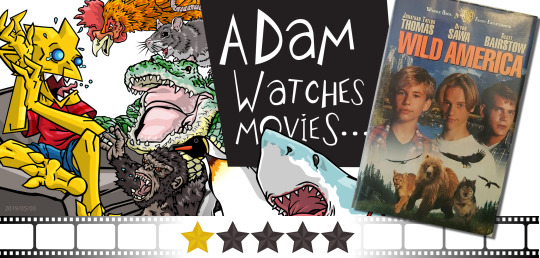
Wild America is a film without a purpose. It tells a story no one wanted to see. Based on true events, it opens in 1967 and tells the story of Marshall Stouffer (Jonathan Taylor Thomas) and his brothers Mark (Devon Sawa) and Marty (Scott Bairstow) who would eventually become great nature documentarians.
This is one of the worst family movies I've seen in a long time. I won’t pretend to know what happened behind the scenes or what the film's pitch was like but the goal had to be something like this: Wild America is a nature documentary show that played on PBS from 1982 to 1994. It was insanely popular. Now let's tell everyone what inspired the prolific documentarians. The brand recognition combined with the popular teen actors should equal a license to print money... in this case, a lot of $3 bills.
No aspect of this film is convincing. The comedic and adventurous tone means everyone in the film is a cartoon. I doubt the Stouffer's first wilderness trip included nearly getting blown up while in the middle of a military weapons testing ground or nearly getting eaten while discovering a mythical cave filled with bears. The tone and characters' actions are all over the place and several developments will leave you utterly bewildered.
You would think that because the title is Wild America and it’s telling us how the Stouffer brothers began as filmmakers that this picture would focus on nature and wildlife. Instead, the attention is given to wild antics. It isn't interested in the majesty of the flora and fauna of North America, nearly as much as people getting attacked by moose and loudly screaming while holding onto their antlers for dear life.
You won't be able to stand anyone in the film. The three heroes are bland and immature. Their only redeeming quality is their inexplicable luck when it comes to accidentally capturing footage of animals. Their father (Jamey Sheridan) is a jerk who deliberately attempts to crush their dreams like an empty can of cheap beer. We get some one-dimensional bullies thrown in for kicks. Everyone else is a comedic sketch or bizarrely out of place. Bet you'd never expect a group of nude hippies or a lady Two-Face in here but just wait. With a lame-brained story that consists of the boys falling into one situation where they get an awesome shot of animals after another and then a cheesy plot about father/son bonding, its only hope is decent cinematography and animal footage. Instead, how about some awful special effects? It’s easy to tell the animatronic animal heads (and there are many) from the real deal and several prolonged shots of what is clearly a man in a phony bear costume pretending to be roaring while stock sounds play gave me flashbacks to Meet the Spartans. I would've been laughing if the barrage of anti-comedy hadn’t sucked every last chuckle out of my body.
It’s an adventure movie that’s badly written and populated with characters you dislike, it's predictable, cheap, and even includes a couple of bad performances to round it off nicely. As the end credits began to roll, I had a glimpse of hope. Next to the list of sinners who partook in this effort is actual footage shot for the Wild America TV series. I was excited... until I realized I was watching a Full-screen VHS. To allow the image to fit, everything is squashed. Now the credits are illegible and the wildlife footage is but a ghost of what it must've looked like in real life. Aside from a couple of shots where the mountains, forests, and rivers look good, there's nothing to like about Wild America. (Full-screen version on VHS, April 30, 2015)
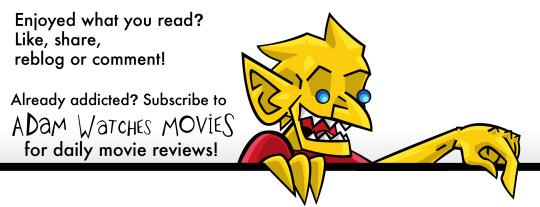
#WildAmerica#movies#films#reviews#moviereviews#filmreviews#FilmCriticism#Williamear#DavidMichaelWieger#JonathanTaylorThomas#DevonSawa#ScottBairstow#FrancesFisher#JameySheridan#1997Movies#1997Films
1 note
·
View note